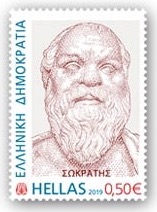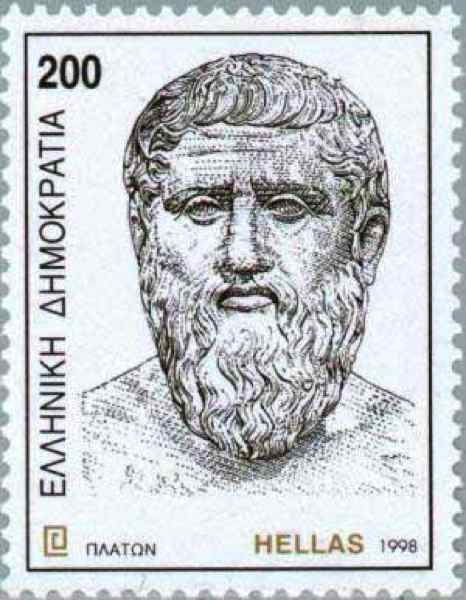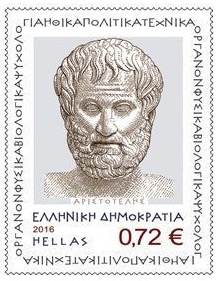Socrates, Plato and Aristotle are commonly referred to as the Big Three of ancient Greek philosophy. They are also sometimes referred to as the Socratic trio (since Plato was a student of Socrates and Aristotle was a student of Plato) and the Athenian philosophers (since all three lived and taught in Athens, Greece).
Together, these three philosophers laid the groundwork for Western philosophy, and their ideas continue to shape modern thought in many areas, including ethics, metaphysics, politics and more.
Socrates

Socrates (469/470 BCE – 399 BCE) was born in Athens to a stonemason father and a midwife mother. Raised in a devout household, he served in the Athenian army during the Peloponnesian War. After the war, Socrates devoted himself to philosophy, seeking wisdom through self-examination and by questioning others. Married to Xanthippe, with three sons, Socrates lived a simple life, rejecting wealth and status.
His methods, now known as the Socratic Method, involved probing conversations to expose ignorance and encourage critical thinking. This drew admiration from young philosophers like Plato and Xenophon but also criticism from Athenian authorities. In 399 BCE, Socrates was tried, convicted of “corrupting the youth” and impiety, and sentenced to death by drinking hemlock from a poisonous plant (conium maculatum).
Here are three anecdotes that illustrate the Socratic method:
One day, a young man named Chaerephon asked the Oracle at Delphi if anyone was wiser than Socrates. The Oracle replied, “No one is wiser than Socrates.”
Socrates was puzzled upon hearing this. He knew he wasn’t wise, so he set out to find someone who was wiser. He visited prominent Athenians, including politicians, poets and philosophers, asking them questions to test their wisdom. However, he found that they didn’t really know what they thought they knew. In fact, they were often ignorant of their own ignorance.
Socrates realised that the Oracle’s statement was true, but not in the way he initially thought. He concluded that his own awareness of his ignorance made him wiser than others, who were unaware of their own limitations.
Once, Socrates was conversing with Meno, a nobleman, about the nature of knowledge and reality. Meno was struggling to understand, so Socrates called over a slave boy who was present and began questioning him.
Socrates asked the boy, who had no formal education, about geometry and mathematical concepts. Through a series of questions, Socrates guided the boy to arrive at a profound understanding of these concepts, including the concept of the square root.
Meno was amazed, as the boy had seemingly acquired knowledge he didn’t previously possess. Socrates used this example to illustrate his theory of recollection, which posits that knowledge is innate and can be accessed through questioning and reflection.
Alcibiades, a young and handsome Athenian nobleman, was known for his arrogance and pride. One day, he approached Socrates, seeking to learn from him.
Socrates, instead of flattering Alcibiades, began questioning him about his values and beliefs. He asked Alcibiades if he knew what justice, courage and wisdom were.
Alcibiades was taken aback, realising that he didn’t truly understand these concepts. Socrates continued to probe, showing Alcibiades that his beliefs were shallow and contradictory.
Alcibiades was initially defensive but eventually became humble and receptive to Socrates’ teachings. This encounter marked a turning point in Alcibiades’ life, as he began to seek wisdom and self-improvement.
The above anecdotes illustrate Socrates’ humility, self-awareness and commitment to seeking knowledge, which are core aspects of his philosophy. His belief in the power of questioning and dialogue to uncover knowledge and understanding inspired transformation in those who sought his guidance.
Socrates’ teachings can be summarised as follows:
Core Ideas:
- Know Thyself: Understand your own limitations, biases and ignorance.
- The Unexamined Life: A life without self-reflection and examination is not worth living.
- Wisdom: Recognise the limits of your knowledge and seek wisdom through questioning.
- Virtue: Cultivate virtues like justice, courage and wisdom to achieve human flourishing.
- Ethics: Focus on ethics and development of moral character.
Method:
- Socratic Method: Ask questions to encourage critical thinking, expose assumptions and arrive at true understanding.
- Dialogue: Engage in conversations to explore ideas and arrive at the truth.
- Refutation: Challenge assumptions and ideas through questioning.
Key Concepts:
- The Form of the Good: A universal, eternal and perfect concept of goodness.
- Recollection: Knowledge is innate and can be accessed through questioning and reflection.
- Daimonion: An inner voice or intuition guiding moral decisions.
Legacy:
- Western Philosophy: Socrates’ ideas and methods have shaped Western philosophy.
- Influence on Plato and Aristotle: Socrates’ students, Plato and Aristotle, built upon his ideas.
- Enduring Relevance: Socrates’ teachings remain relevant even today, emphasising self-awareness, critical thinking and ethical living.
Socrates was sentenced to death by the Athenian court in 399 BCE on the following charges:
- Corrupting the youth: Socrates’ method of questioning and dialogue led some to believe he was teaching young people to question authority and traditional values.
- Impiety: Socrates’ concept of a single, all-knowing God (as expressed in his daimonion, or inner voice) conflicted with the then polytheistic beliefs of Athens.
The trial was likely politically motivated and the sentence was death by drinking hemlock. When his friend Crito visited him in prison and offered to help him escape, citing his wealth and connections, Socrates refused, arguing that:
- He had lived by the laws of Athens and must obey them, even if unjust.
- Escape would harm his friends and family, who would be punished for aiding him.
- He had spent his life teaching the importance of obedience to the law.
Crito countered that Socrates’ death would be a tragic waste. Socrates replied:
“The unexamined life is not worth living, but the unlawful life is worse.”
Socrates chose to drink the hemlock, accepting his sentence, demonstrating his commitment to principles and the rule of law.
Plato

Plato (427/428 BCE – 347 BCE) was born into an aristocratic family of Athens. His real name was Aristocles, but he was nicknamed Plato (meaning “broad” in Greek) due to his broad shoulders. As a young man, Plato was a student of Socrates, deeply influenced by his methods and ideas. After Socrates’ death, Plato travelled extensively, studying mathematics, astronomy, and philosophy. He returned to Athens and founded the Academy (c. 387 BCE), one of the earliest institutions of higher learning in the Western world.
Plato wrote influential philosophical works, mostly in the form of dialogues, exploring metaphysics, ethics, politics, and education. He died at the age of 80, leaving behind a legacy as one of the greatest philosophers in history.
Plato’s association with Socrates is highly significant in the history of western philosophy. Here are some key aspects of their relationship:
- Student-Teacher: Plato studied under Socrates for nearly a decade, until Socrates’ death in 399 BCE.
- Socratic Dialogues: After Socrates’ death, Plato wrote numerous philosophical dialogues, mostly in the form of conversations between Socrates and other characters. His most famous works, such as The Republic and The Symposium, explore Socratic ideas and methods.
- Founder of the Academy: Plato founded the Academy in Athens (c. 387 BCE), one of the earliest institutions of higher learning in the Western world. He taught his own philosophical ideas, building upon Socratic principles..
- Development of Platonic Philosophy: While deeply influenced by Socrates, Plato developed his own distinct philosophical views, such as the Theory of Forms and the concept of the Immortality of the Soul.
- Influence on Christianity: Platonic concepts influenced early Christian thought.
Plato’s teachings can be summarised as follows:
Core Ideas:
- Theory of Forms: Eternal, perfect and abstract concepts (e.g., justice, beauty) underlie imperfect physical reality.
- Immortality of the Soul: The soul exists before birth and after death, seeking knowledge and wisdom.
- Tripartite Soul: The soul consists of Reason, Spirit and Appetite, which must be balanced.
- The Allegory of the Cave: Humans perceive reality imperfectly, like prisoners seeing shadows.
Epistemology (Knowledge):
- Innate Knowledge: Knowledge is innate, and is accessed through recollection.
- Dialectics: Questioning and dialogue reveal truth.
Metaphysics (Reality):
- Dualism: Physical and spiritual realms coexist.
- Eternal and Changing: Eternal forms contrast with changing physical world.
Ethics and Politics:
- The Philosopher-King: Rulers should be philosopher-kings, guided by wisdom.
- Justice: Harmony between individual and societal justice.
- The Republic: Ideal society with three classes: producers, warriors, and rulers.
Other Key Concepts:
- The One and the Many: Unity and diversity coexist.
- The World of Becoming: Constant change characterises physical reality.
- Platonic Relationship: A close, non-sexual and non-romantic bond between two people of any gender, which can include parents and children, teachers and students, or colleagues.
Aristotle

Aristotle (384 BCE – 322 BCE) was born in Stagira, Macedonia (an ancient kingdom on the periphery of Greece), to a physician at the royal court. At 17, he joined Plato’s Academy in Athens, studying philosophy, science and ethics for nearly 20 years. After Plato’s death, Aristotle tutored Alexander the Great and later founded the Lyceum in Athens (335 BCE), a rival philosophical school to Plato’s Academy.
Aristotle’s vast research and writings spanned philosophy, science, and ethics, including Metaphysics, Nicomachean Ethics, and Politics. He emphasised empirical observation, reasoning and intellectual curiosity, laying the foundations for Western science, logic and philosophy. Aristotle’s ideas dominated intellectual thought for centuries, shaping the development of various fields, including biology, physics and ethics. He died at 62, leaving behind a vast legacy as one of the greatest thinkers in human history.
Aristotle being a student of Plato’s Academy, both of them shared an extraordinary relationship:
- Student-Teacher: Aristotle joined Plato’s Academy in Athens at the age of 17 (c. 367 BCE) and studied under Plato for nearly 20 years, until Plato’s death in 347 BCE.
- Influence of Platonic Thought: Aristotle was deeply influenced by Plato’s ideas, particularly the Theory of Forms, the concept of the Immortality of the Soul, and the importance of reason and intellect.
- Tutor to Alexander the Great: After Plato’s death, Aristotle tutored Alexander the Great (356-323 BCE), who later conquered a vast portion of the known world.
- Founding of the Lyceum: Aristotle founded the Lyceum in Athens (c. 335 BCE), a rival philosophical school to Plato’s Academy.
- Development of Aristotelian Philosophy: While building upon Platonic ideas, Aristotle developed his own distinct philosophical views, such as:
– The concept of causality and the Four Causes
– The idea of telos (purpose) and potentiality
– The development of logic and the syllogism
– The concept of the Mean and virtues
- Critique of Platonic Ideas: Aristotle also critiqued some of Plato’s ideas, such as the Theory of Forms, which he believed were too abstract and disconnected from the physical world.
Aristotle’s teachings can be summarised as follows:
Core Ideas:
- Telos: Everything has a purpose or goal (telos).
- Four Causes: Material, Formal, Efficient and Final causes explain why things exist.
- Potentiality and Actuality: Things have potential and actual properties.
- The Four Virtues: Courage, Justice, Temperance and Wisdom.
- Eudaimonia: Human flourishing and happiness.
Metaphysics (Reality):
- Substance and Accidents: Substances have essential and non-essential properties.
- Potentiality and Actuality: Reality is a balance of potential and actual properties.
- The Prime Mover: An unmoved, eternal and perfect being (God).
Epistemology (Knowledge):
- Empiricism: Knowledge comes from sensory experience.
- Induction and Deduction: Reasoning methods for acquiring knowledge.
- The Laws of Non-Contradiction and Excluded Middle: Fundamental logical principles.
Ethics and Politics:
- The Mean: Virtues are found in a middle ground between extremes.
- The Common Good: Society’s goal is the common good.
- The Mixed Constitution: A balanced political system.
- Nicomachean Ethics: Living a virtuous life, cultivating good habits and building character, and exercising reason to balance emotions and desire.
Other Key Concepts:
- Hylomorphism: Matter (hyle) and form (morphe) compose reality.
- The Four Elements: Earth, Water, Air and Fire.
- The Concept of Entelechy: Potentiality and actuality in living things.
Commonalities between Socrates, Plato and Aristotle:
- Ancient Greek roots: All three were born in ancient Greece, with Socrates and Plato from Athens, and Aristotle from Stagira, Macedonia.
- Interconnectedness: Socrates taught Plato, who in turn taught Aristotle, creating a philosophical lineage.
- Pursuit of wisdom and knowledge: A shared passion for understanding and wisdom drove their philosophical endeavours.
- Philosophical inquiry: Each was deeply committed to philosophical exploration, seeking wisdom and understanding.
- Emphasis on reason and intellect: All three valued reason, critical thinking and intellectual curiosity.
- Use of dialogue and discussion: Socrates’ method, Plato’s dialogues and Aristotle’s use of discussion and debate, all reflect a shared emphasis on interactive learning.
- Interest in ethics and politics: Each explored ethics, politics and human nature in their works.
- Critique of societal norms: Socrates, Plato and Aristotle challenged prevailing beliefs and social norms, promoting critical thinking and reform.
- Influence on Western philosophy: Socrates, Plato, and Aristotle laid the groundwork for Western philosophy, shaping its development for centuries.
- Enduring legacy: Their ideas continue to influence contemporary thought, ensuring their relevance and importance.
Image 1: Postage stamp issued by Greece in 2019 to commemorate Socrates’ contribution to Greek literature. Courtesy https://philatelycurated.substack.com/
Image 2: Postage stamp issued by Greece in 1998 to commemorate Plato’s contribution to western philosophy. Courtesy https://mathshistory.st-andrews.ac.uk/
Image 3: Postage stamp issued by Greece in 2016 to mark 2400 years since the birth of Aristotle. Courtesy Hellenic Philatelic Society of The Netherlands.
